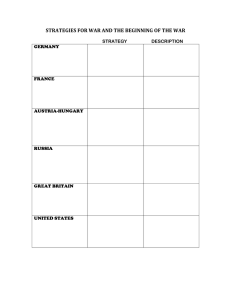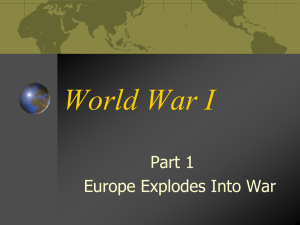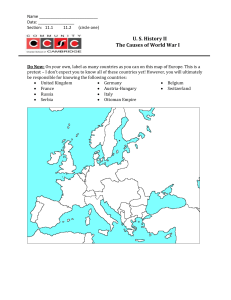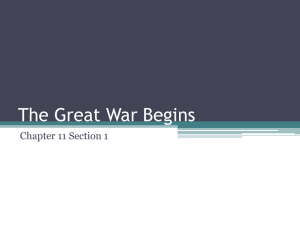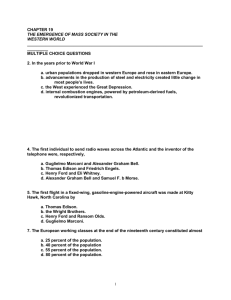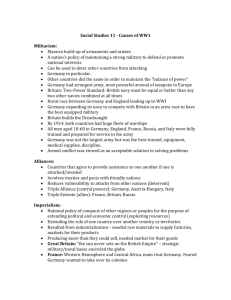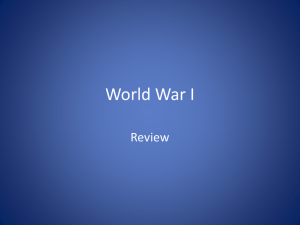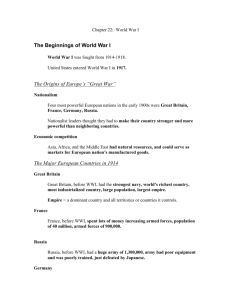Causes of WWI A. Industrialism led to increased
advertisement
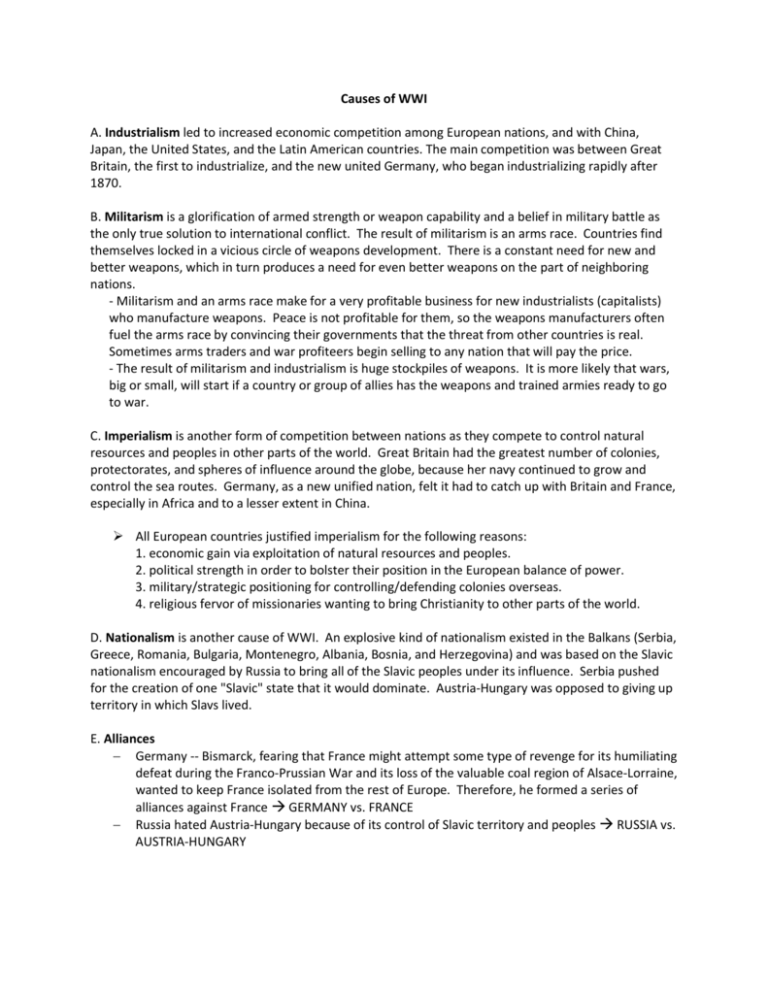
Causes of WWI A. Industrialism led to increased economic competition among European nations, and with China, Japan, the United States, and the Latin American countries. The main competition was between Great Britain, the first to industrialize, and the new united Germany, who began industrializing rapidly after 1870. B. Militarism is a glorification of armed strength or weapon capability and a belief in military battle as the only true solution to international conflict. The result of militarism is an arms race. Countries find themselves locked in a vicious circle of weapons development. There is a constant need for new and better weapons, which in turn produces a need for even better weapons on the part of neighboring nations. - Militarism and an arms race make for a very profitable business for new industrialists (capitalists) who manufacture weapons. Peace is not profitable for them, so the weapons manufacturers often fuel the arms race by convincing their governments that the threat from other countries is real. Sometimes arms traders and war profiteers begin selling to any nation that will pay the price. - The result of militarism and industrialism is huge stockpiles of weapons. It is more likely that wars, big or small, will start if a country or group of allies has the weapons and trained armies ready to go to war. C. Imperialism is another form of competition between nations as they compete to control natural resources and peoples in other parts of the world. Great Britain had the greatest number of colonies, protectorates, and spheres of influence around the globe, because her navy continued to grow and control the sea routes. Germany, as a new unified nation, felt it had to catch up with Britain and France, especially in Africa and to a lesser extent in China. All European countries justified imperialism for the following reasons: 1. economic gain via exploitation of natural resources and peoples. 2. political strength in order to bolster their position in the European balance of power. 3. military/strategic positioning for controlling/defending colonies overseas. 4. religious fervor of missionaries wanting to bring Christianity to other parts of the world. D. Nationalism is another cause of WWI. An explosive kind of nationalism existed in the Balkans (Serbia, Greece, Romania, Bulgaria, Montenegro, Albania, Bosnia, and Herzegovina) and was based on the Slavic nationalism encouraged by Russia to bring all of the Slavic peoples under its influence. Serbia pushed for the creation of one "Slavic" state that it would dominate. Austria-Hungary was opposed to giving up territory in which Slavs lived. E. Alliances Germany -- Bismarck, fearing that France might attempt some type of revenge for its humiliating defeat during the Franco-Prussian War and its loss of the valuable coal region of Alsace-Lorraine, wanted to keep France isolated from the rest of Europe. Therefore, he formed a series of alliances against France GERMANY vs. FRANCE Russia hated Austria-Hungary because of its control of Slavic territory and peoples RUSSIA vs. AUSTRIA-HUNGARY New Alliances in Post-Bismarck Europe: a. When Kaiser Wilhelm II succeeded his grandfather, France moved quickly to negotiate an agreement with Russia. Russia agreed to form an alliance with France in exchange for financial loans FRANCE + RUSSIA vs. GERMANY b. Germany now faced one of its greatest fears, the possibility that if war did occur it could be a two-front war. (In reaction to this concern, German military planners worked hard to devise methods of avoiding a two-front war. When WWI finally begins, Germany will try to use the Schlieffen Plan to make a quick and decisive attack against France by going through neutral Belgium.) c. France also came to an agreement with Britain in 1904, forming the Entente Cordiale, which just said the two countries would be friendly. In 1907, Russia joined them in the Triple Entente. Although Russia and Britain were far from close friends, they recognized the value of a mutual agreement in the face of a possible German aggression (balance of power diplomacy) FRANCE + BRITAIN + RUSSIA vs. GERMANY At first, the new alliances seemed to be a good idea. The feeling of security each major power got from allying with another strong country, however, can also be seen as making them more comfortable to make a fuss about minor issues. With an ally behind them, some countries felt secure in pushing their enemies around. Smaller nations especially might press more for their goals if they know they have "big friends" who will come to their defense.
